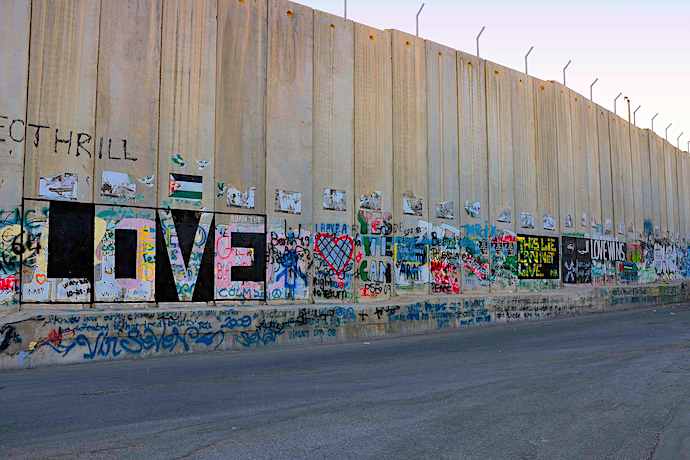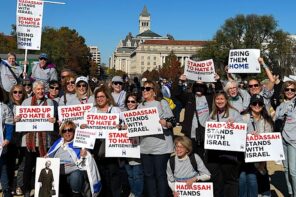Amnesty International has just released a new, comprehensive report on the situation in Israel/Palestine. Like earlier reports from Human Rights Watch, Yesh Din, and B’Tselem—leading human rights groups documenting Israel’s treatment of the Palestinians along with Palestinian organizations like Al-Haq and Al Mezan—Amnesty has concluded that Israel is guilty of the crime of apartheid, a category of international law named after the old South African system but distinct from that specific case.
The basis of the accusation is widely and deeply documented. Charges include extensive and ongoing dispossession of land and property, unlawful killing and arrest, denial of basic rights and freedoms, restrictions on movement, and much more. Some of these—particularly ongoing crimes in the West Bank—are well known. Amnesty goes beyond some earlier reports, however, in documenting how Israel has been engaging in some of these crimes since its foundation. They call for Israel to reform itself to be in compliance with international law and to offer justice to its past victims.
As expected, the Israeli government and American Jewish organizations parroting its talking points attacked the organization as “antisemitic” and its report as “libelous,” cheapening these grave terms to describe facts they don’t like. None of them addressed the actual evidence of Amnesty’s report. The response seems to be a knee-jerk reaction, nearly identical to their responses to other similar reports.
For example, Israeli government officials responded by stating that all citizens enjoy equal rights in Israel. Besides being false in both practice and law, this is a circular fallacy that dodges the problem that Jews in the West Bank are citizens of Israel while Palestinians are not. It would be like antebellum America claiming that all citizens were equal, ignoring the fact that millions of African Americans in slave states could not be citizens. Similarly, in a joint statement, the U.S. groups dwell at length on the differences between Israel and South Africa, ignoring that the crime of apartheid is distinct from the specific case in South Africa from which it was named.
It’s time to end these frivolous accusations of “antisemitism,” a tactic that cheapens the term and avoids discussing what’s truly at stake. Instead, we need to focus on the issues themselves, particularly ongoing crimes in the West Bank.
Instead of reposting old talking points that dismiss out of hand the findings of yet another renowned human rights organization, those who oppose the label could have used their time to engage critically with the endless list of deeply alarming developments we’re seeing out of Israel-Palestine: from almost daily settler violence (often backed by the IDF), to new revelations about the 1948 massacre at Tantura, to the killing of two elderly Palestinian men by Israeli forces, to literal pogroms against Palestinian communities.
These are the types of crimes that inform these reports, along with broader historical and legal issues: from theft and redistribution of Palestinian property by the state since 1948, to the 2018 nation-state law. Yet these groups only rarely acknowledge these issues, let alone discuss what to call them.
Is Amnesty’s case for Israel constituting an apartheid state an overstatement, or perhaps the wrong category of international law to apply? Scholars and laypeople working in good faith should be able to discuss this without vitriol, ad hominem attacks, or red herring distractions. Certainly, the case in the West Bank is overwhelming.
Whether the evidence Amnesty has brought regarding Israel “proper” as to the vastly different treatment, rights, and opportunities of Jews and Palestinians since its founding constitutes “apartheid” or not is worth a conversation.
However, the distraction of hyperbolic attacks must stop. Neither Amnesty nor any of the other organizations detailing this structural inequality has called for the “liquidation” of Israel. They’ve called for its restructuring in accordance with international law. Those who object that this would make Israel a binational state ignore that the reality on the ground is already binational, but only one national group under Israeli control receives full rights and protections. No state—no matter how just the cause of its establishment—has the right to exist based on the indefinite oppression of others or the supremacy of one ethnic group over another. Calling out and opposing this situation is not antisemitism.
If you believe the label of “apartheid” is wrong, then address the individual charges—refute or contextualize them one by one—and explain why it doesn’t apply. Perhaps it’s simply awkward when the most truthful rebuttal might be to admit that one is defending this unequal and criminal “status quo,” the phrase used to describe the system of oppression in the West Bank and superior Jewish rights in pre-1967 Israel. Perhaps it feels easier to cry “antisemitism” than to spell out the actual argument because there really isn’t one—or a good one, at any rate.
Jews living in Israel have a right to live with self-determination, freedom, and security. But so does everyone else living there. Palestinians have an equal right to self-determination, freedom, and security, all of which are currently lacking for many of them—particularly security. Confusing advocacy for Palestinian rights and a truly democratic Israel with antisemitism perverts the accusation and undermines the legitimate fight against it.
Next week, the Senate will finally begin hearings to confirm Deborah Lipstadt as the State Department’s antisemitism monitor. Let us use this opportunity to focus on the actual threats to Jews today, to affirm the United States’ commitment to pluralistic, multiracial democracy as the form of government that best allows Jews and others to flourish, and to commit to opposing the false conflation of antisemitism with advocacy of Palestinian equality.





